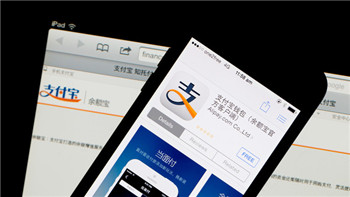(单词翻译:单击)

阅读提示:中文在上,对照英文在下
我感觉自己就像是女王:住在上海,只要我愿意,我身上可以不用带任何像现金(或信用卡)这样的平民化的东西。
I feel like the Queen: if I chose to do so, I could live in Shanghai without carrying anything so plebeian as cash (or even credit cards).
中国消费者可以用智能手机购买几乎任何东西并付款,很多人也确实在这么做。早餐、午餐和晚餐?挥一挥iPhone魔杖,就有人骑电动车送上门——在“饿了么”等外卖APP点餐通常免配送费,还经常打折。再挥一下魔杖,出租车来了,以折扣价载你出行。再挥一下,就有医生通过电话给你看病,每次通话仅需9.9元人民币(合1.5美元)。
Chinese consumers can (and do) swipe smartphones for almost everything. Breakfast, lunch and dinner? With a wave of the iPhone wand, it arrives on a motorbike, delivered often for free and usually at a discounted price, from food delivery apps such as Ele.me (meaning “are you hungry?”). Wave it again, and a taxi appears, ready to offer a discounted ride. Wave it once more, and there’s a doctor ready to diagnose any ailment by phone for only Rmb9.9 ($1.5) per call.
这被称为O2O,或者“线上到线下”,瑞信(Credit Suisse)预计,O2O从现在起到2017年将以63%的复合年率增长,将达到420亿元人民币规模。线上和线下的结合很快还将走进社区菜市场这种最传统的购物场所——届时上海人用手机扫一扫,就能够为从理发到拔牙、再到购买晚餐鱼头等各种服务和商品付款。
It’s called O2O, or “online to offline” , and is forecast to grow at a compound annual rate of 63 per cent between now and 2017, to Rmb42bn, according to Credit Suisse. The marriage of online and offline will soon come even to that most traditional of venues, the neighbourhood wet market, where Shanghainese will be able to swipe a phone to buy anything from a haircut to a tooth extraction to a fish head for supper.
浙江省东部温州市的一家菜市场已经开始允许消费者用手机扫码购买所有商品,用支付宝(Alipay)支付。支付宝是电商集团阿里巴巴(Alibaba)旗下的移动支付服务平台。上海也计划推出这类菜市场,届时我不用掏钱包,就能买上一桶鳝鱼或一条(带蹄髈)猪腿。
A wet market in Wenzhou, in eastern Zhejiang province, has already started letting consumers wave their mobile phones at all of its goodies, and pay with Alipay, the mobile payments service affiliated to ecommerce group Alibaba. Shanghai plans to follow suit, at which point I will be able to load up on a bucket of eels or a leg of pork (with hoof attached) without pulling out my purse.
就我个人而言,购买大部分商品时,我仍宁愿拿着一叠沾满细菌、上面印着毛泽东头像的百元钞票付款。但其他人不愿意,至少中产阶级和40岁以下年轻人不愿意。上海人民广场附近受政府补贴的便民早餐车前,西装革履的男士们在早高峰期间排队用智能手机为他们的馒头或者手抓饼扫码付账。手抓饼是一种美味的中国式油煎薄饼。我非常赞成这种方式:如果递给我手抓饼的人没有接触过那些上面沾有所有人细菌的人民币,我会更喜欢这种食物。
Personally, I still prefer grimy, germ-laden piles of Rmb100 notes with the face of Mao Zedong on them for most of my shopping. But hardly anyone else does (or at least hardly anyone middle class and under 40). At the government-subsidised Loving Help breakfast cart near Shanghai’s People’s Square, men in suits queue up during morning rush hour to swipe their smartphones for a steamed bun or a shouzhuabing, a delectably greasy Chinese-style crepe that literally translates as “hand-grab pancake”. I’m all for that: I prefer it if the hand grabber of that pancake to serve it to me has not just been handling a wad of the people’s currency (with all the people’s bacteria on it).
在附近一幢写字楼外面,一位“饿了么”的派送员蹲在一个蓝色隔热保温袋旁,他要配送顾客们预定的30多份早餐,这些人想必为了维持不断放缓的经济而非常努力地工作,以致于没有时间走上两分钟去附近快餐店吃早餐。我只花了4元人民币(配送免费)就买到了烟肉蛋汉堡加咖啡。好吧,咖啡是凉的,他们还忘记送奶油和糖了,但冲着这份价格和便利,我还是很高兴用一下微波炉的。
Outside a nearby office building, an Ele.me delivery man squats next to a blue insulated cooler bag, from which he dispenses 30-odd breakfasts — ordered in advance by people presumably working so hard to keep the slowing economy afloat that they do not have time to walk two minutes to the nearest fast-food emporium. I got my Egg-McMuffin-and-coffee meal for only Rmb4 (free delivery). OK, the coffee was cold and they forgot the cream and sugar, but for this price and convenience I am happy to use the microwave.
如果说午餐有什么不同的话,那就是更方便一些:在同一幢大楼里有一个被称为“Fun Box”的自动售卖机,消费者可以在售卖机自取通过APP预订并付费的午餐。晚餐呢?即便是当地油腻的小店也接受手机扫码支付。在我们点上一碗馄饨和一盘里脊肉串的时候(用支付宝付账),一位现年29岁的上海国企会计师周丽娟(音译)表示,她现在几乎都不带现金了。“有时候我钱包里1000元人民币能放好几个月。”
Lunch is, if anything, even easier: in the bowels of the same building is a vending machine called the Fun Box dispensing app-ordered meals paid for by smartphone. Dinner? Even the local greasy chopstick accepts payment by swipe-phone. As we sit over a bowl of wontons and a plate of fried pork strips (paid by Alipay), Zhou Lijuan, 29, an accountant at a Shanghai state-owned enterprise, says she hardly ever carries cash any more. “Sometimes Rmb1,000 in cash can stay in my purse for months.”
但是等一下:这些人听说过中国经济正在放缓吗?他们为什么仍在大把花钱?周丽娟有一个还在学走路的孩子,她说,经济放缓——这个消息震动世界各地的市场——对“她的消费行为没有大影响”。她去年“光棍节”期间花了1万元人民币——光棍节是阿里巴巴发明的全球最大的购物日(最初针对未婚人士)。这比她一个月的收入还高,但她准备在今年11月11日的光棍节再次大举购物,尽管经济放缓。“我会买很多东西,我不会太理性。如果我看到真的便宜的东西,我会哇哇叫着买下来。”实际上,尼尔森(Nielsen)的调查显示,逾半的受访者表示,这个光棍节他们计划比去年花更多的钱。
But wait a minute: have these people heard that the economy is tanking? Why are they still spending? Ms Zhou, mother of a toddler, says news of the slowdown — which has shaken markets worldwide — has made “no major impact on my consuming behaviour”. She spent Rmb10,000 last year on Singles Day , the Alibaba-invented biggest shopping day in the world (originally targeted at unmarried people). That is more than a month’s income but she’s ready for another big Singles Day on November 11, despite the slowdown. “I’ll purchase a lot, and I won’t be very rational about it. If I see a real bargain, I’ll say ‘waaahhh’ and buy it.” In fact, according to a Nielsen survey, more than half of those surveyed said they plan to spend more this year than last.
全球市场无疑会认真审视中国今年光棍节期间出现的每一个趋势,看看中国经济到底行还是不行。不管怎样,上海的上班族们仍会通过O2O订餐。但“饿了么”表示打算减小折扣力度,所以赶紧“趁热”在手机上购买巨无霸汉堡吧。看来天底下真的没有免费午餐,即便是在拥有全球最大购物节的国家。
The world’s markets will doubtless scrutinise every Single’s Day trend this year for signs that the Chinese economy is (or is not) doomed. Either way, Shanghai’s workers will keep ordering O2O meals. But Ele.me says it is reducing its discounts, so get your smartphone-swiped Big Macs while they are hot. It seems there is no free lunch, even in the land of the world’s biggest shopping festival.


